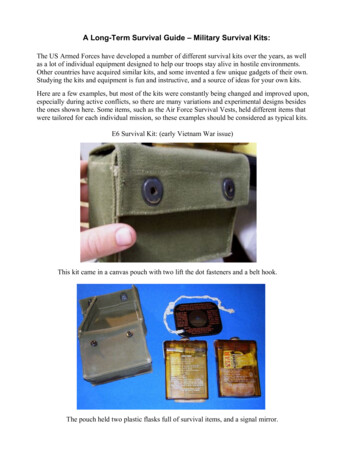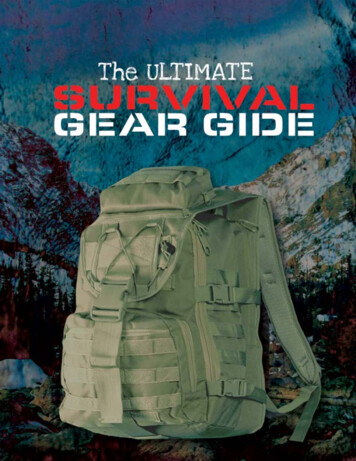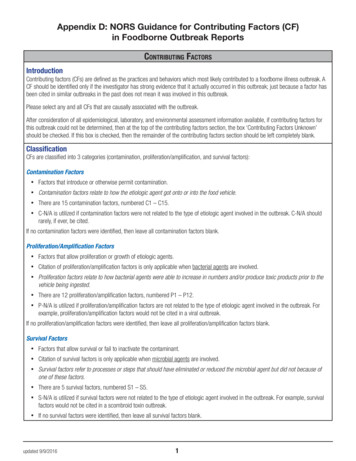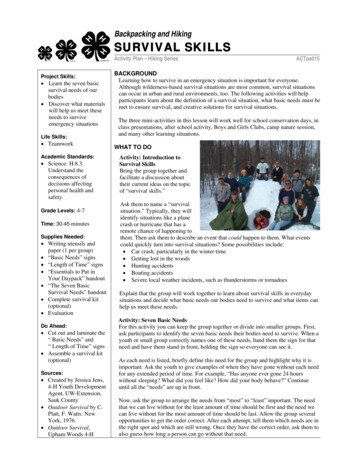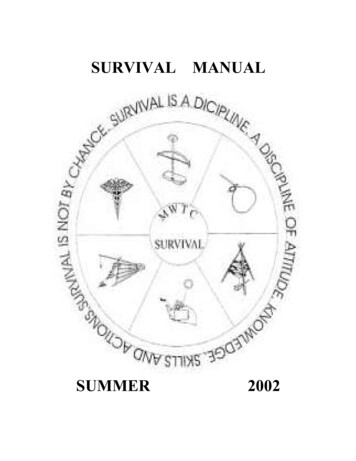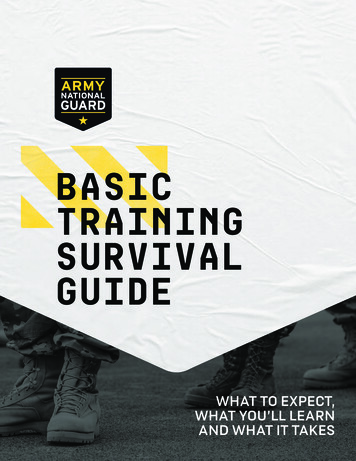
Transcription
BASICTRAININGSURVIVALGUIDEWHAT TO EXPECT,WHAT YOU’LL LEARNAND WHAT IT TAKES
ARMY NATIONAL GUARDTABLE OFCONTENTS2PAGE 310 WEEKS THAT WILL CHANGE YOUR LIFEPAGE 4FIRST STOP: RECEPTION BATTALIONPAGE 6MAKE A GOOD FIRST IMPRESSIONPAGE 7IT’S TIME TO TRAINPAGE 8CONQUER BASIC TRAINING IN THREE PHASESPAGE 9BCT GRADUATION REQUIREMENTS
BCT LASTS 10 WEEKS.YOU’LL COMPLETE IT ATONE OF FOUR LOCATIONS: Fort Benning, GA Fort Jackson, SC Fort Leonard Wood, MO Fort Sill, OKYou’ll be assigned aBasic Training locationafter you officially enlist.10 WEEKSTHAT WILLCHANGEYOUR LIFEOnce you’ve decided to join the Guard, passed the eligibilityrequirements and taken the oath, the next step on yourjourney from civilian to Soldier is Basic Combat Training(BCT). While physical fitness training is a big part of it, BCTis not all about push-ups and sit-ups. You’ll also learn thebenefits of discipline in allyou do. You’ll learn core Army Values, alongwith critical combat and occupational skills. You’ll learn todepend on your fellow Soldiers. You’ll earn their trust as well.The physical and mental training exercises are rigorous—butthe rewards are extraordinary, and they last a lifetime.Following is some information and insights intothe Basic Training experience. We’re providing this guide as asource to help you decide whether becoming a Soldier is theright path for you.3
ARMY NATIONAL GUARDFIRST STOP:RECEPTIONBATTALIONAt Reception Battalion, also known as Week Zero, your blood,hearing and vision will be tested, and you’ll receive immunizationsand a dental exam. On-base healthcare professionals also take X-raysand screen for pregnancy and tuberculosis. You’ll fill out a prettysignificant series of forms, so make sure you’ve got your SocialSecurity number memorized before you get on the bus to Basic.At Reception Battalion, you’ll receive items such as ear plugs,eyewear and sunscreen that help you maintain a state ofmedical readiness.TYPICAL RECEPTION BATTALION SCHEDULEDAY 1ZERO DAYAMNESTY BRIEFPAY STATIONMEDICAL EXAMSGENERAL ORIENTATIONWhen you arrive, you’ll betold what you can and cannothave at BCT. This will be yourlast chance to get rid of anyprohibited items withoutbeing penalized.After getting up at 5 a.m.and eating breakfast in thechow hall, you’ll go to the PayStation to receive your ID card(if you don’t already have one).The general medical examincludes a blood test.Females will have a bloodtest for pregnancy, and thena regular blood test on Day 2.CIF (CENTRALISSUING FACILITY)BRIEFINGSThis station will introduce youto some Army basics,such as the chaplain’s role,the Red Cross, the UniformCode of Military Justice(UCMJ), company policiesand managing yourpersonal affairs.MILITARY RECORDKEEPINGWith the paperwork youbrought with you, you’ll setup the medical, financial andpersonnel records that will lastfor your entire military career.4Here, you’ll be issued your firstArmy equipment, includingyour uniform. Your civilianclothes will be returned to youafter Basic.You’ll be briefed on the GIBill, Servicemembers’ GroupLife Insurance (SGLI) and theReserve Component. Duringthe required “Moment of Truth”briefing, you must disclose anyobligations you haven’t dealtwith before arriving at BCT.PX (POST EXCHANGE)If you don’t have items youneed for BCT, you’ll be ableto buy them here. During inprocessing, your feet will beevaluated for the proper typeof running shoes. You maybe told to purchase a newpair. Your old shoes will bereturned to you after Basic.
‘I WILL NEVERACCEPT DEFEAT.I WILL NEVER QUIT.’– FROM THE SOLDIER’S CREEDDAY 2VACCINATIONSYou’ll receive vaccination shots toimmunize you against several viraland bacterial infections, includingmeasles, mumps, diphtheria, rubellaand smallpox. (However, the exactnumber of vaccinations variesby individual.)VISION AND DENTAL EXAMYou’ll have a general vision checkupand a dental exam that includesX-rays. The mouth guard you’llreceive at the dental exam will beutilized during certain BCT exercises.DAY 3EYEGLASSES/INSERTLENSES PROVIDEDIf you need glasses, they’ll bemade on site. You’ll receive twopairs of glasses, plus insert lensesfor your protective mask.PHOTOS, YEARBOOK, BCTVIDEO AND RINGDAYS 4–5FINAL PROCESSINGIf everything is complete, you’ll getassigned to a unit and ship on Day 4.If you missed anything for any reason,you’ll do it on this day and then shipon Day 5. Before you ship, you’ll cleanthe barracks, get your ID tags andstencil your name on your bags.You’ll be photographed in militaryuniform for the yearbook. At thisstation, you might be given theoption to pay in advance for ayearbook, BCT video orgraduation ring.PERSONAL AFFAIRS DIVISIONHere, you’ll review your personalaffairs and verify everything iscomplete. Once you get to your BasicTraining company, your access to aphone will be limited. Because yourmain mode of communication will bewriting letters, it will be much moredifficult to resolve personal issues.THIS IS WHERE HAIRCUTS HAPPEN.If you don’t already have a standard military haircut, you’ll get one. You’ll alsobe issued your your Army Combat Uniform (ACU), another uniform for physicalfitness training, footwear and other items—and you’ll learn how to wear all yournew apparel properly. It sounds elementary, but you’ll be surprised at what youdon’t know about getting dressed, Army-style.5
ARMY NATIONAL GUARDMAKE AGOOD FIRSTIMPRESSIONThe Army has strict rules about appearance that you should know before you show upfor BCT. You don’t want the first Drill Sergeant you meet to single you out as an example.That almost never goes well. Personal appearance is important from the very first day. Itdemonstrates pride and self-discipline, and it helps to build camaraderie in your unit. Andit won’t matter whether you think those statements are true. At this point, it’s all about whatthe Army thinks. Specifically, it’s about what your Drill Sergeant thinks.HERE ARE A FEW ARMY POLICIES REGARDINGYOUR APPEARANCEJEWELRYYou are allowed to wear up to two rings with your uniform, as long as they are tasteful.Some units may allow you to wear a wristwatch. You can wear a religious medal on achain around your neck if both the medal and the chain can be kept out of sight. Femalesmay wear earrings only as a matched pair, with one stud earring per earlobe. Anyearrings must be unadorned and spherical, with a diameter of one-fourth inch or smaller.NOTE: Earrings will not be worn in field environments, combat-related deployments orlocations without access to normal hygiene.BODY PIERCINGOther than earrings, no jewelry or ornamentation attached or affixed to or through theskin may be worn while in uniform. These accessories are also prohibited when you’reon base and out of uniform.COSMETICSCosmetics will not be applied at BCT.YOUR EAGLE CASH CARDAt Reception Battalion, you’ll receivea stored value card that includes anadvance amount of 350. You can usethe card at Exchange Service sitesinstead of using cash or writing checks.You’re encouraged to spend the fullamount before your training is over,but if there’s a balance left, it will bereturned to you.MEET YOUR BATTLE BUDDYWhen you arrive at Basic Training,you’ll be partnered with a battle buddy.Provide each other with encouragement,and be sure to take the followingrules seriously: Never abandon your battle buddy–on or off dutyEvery Soldier is expected to keep fingernails clean and neatly trimmed. For males, thenails should not extend beyond the fingertips. Females should not let their fingernailsextend more than one-fourth inch beyond the tips of their fingers. If a commanderdetermines nails present a safety, image or job performance concern, they may requirethat you cut your nails shorter. ever let your battle buddy go intoNan office or room alone Keep your battle buddy safe Pass information along to yourbattle buddyTATTOOS Encourage your battle buddy totrain harder and do better, andexpect the same in return Help your battle buddysolve problems Inform superiors of any changes inyour battle buddy’s behaviorFINGERNAILSTattoos that can be considered extremist, indecent, sexist or racist cannot be wornanywhere on a Soldier’s body. Tattoos or brands, regardless of subject matter, areprohibited on the head; on the face (except for permanent makeup); on the neck (anythingabove the T-shirt neckline); on or inside the eyelids, mouth and ears; below the wristbone; and on the hands. NOTE: Soldiers may have one ring tattoo on each hand, on theportion of the finger closest to the palm. Other exceptions only include tattoos previouslydocumented with a tattoo validation memorandum.Your superiors will study your actions and your ability to follow instructions from the dayyou arrive. Learning to observe details and adhere to standards will be key to succeedingat BCT.6
ARMY NATIONAL GUARDIT’S TIMETO TRAINOnce you complete the Reception Battalion stage, you’ll be assignedto a training company. Drill Sergeants will come to get you and bringyou to your assigned BCT company location. Males and females willsleep in separate bays, or living spaces.At some point, you may be told to line up your bag in a certain way todetermine whether you can follow instructions. Then you’ll be orderedto empty your bag. If any contraband falls out, you’ll learn about howa Drill Sergeant expresses disappointment.‘YES,DRILL SERGEANT.’‘NO,DRILL SERGEANT.’There’s a proper way to address yoursuperiors in the Guard, and you’ll startlearning it right away with your DrillSergeants. Remember that they areresponsible for shaping you into a Soldier:They’ll be a coach, a counselor and amentor. Show respect to them and theirposition by always answering them witha strong “Yes, Drill Sergeant” or “No,Drill Sergeant.”YOUR TRAINING COMPANY: A WHO’S WHOYour training will include learning theranks of leadership, identifying yourcommanding officers and understandingtheir responsibilities.Drill Sergeants and cadre (all the nonDrill Sergeant personnel assigned to thecompany) will in-process you and assignyou to a platoon, which is made up of 60Soldiers and three Drill Sergeants.The First Sergeant (1SG) assists thecommander and supervises all the DrillSergeants, as well as other personnel.The training officer/executive officer(XO) maintains your training recordsand coordinates daily training schedules.The company commander, a Captain(CPT), establishes policy and has legaldisciplinary authority over all companypersonnel.FITNESS TRAINING IS INTENSE. BE READY.NATIONALGUARD.COM/GUARDFIT7
ARMY NATIONAL GUARDCONQUER BASIC TRAININGIN THREE PHASESBasic Training is divided into three phases. Each phase includes a physical fitness test and is designed to challenge your body and mind. Thecompletion of each stage is a notable achievement and signifies an important milestone in your young Guard career.RED PHASEWHITE PHASEBLUE PHASEIn this phase, also known asPatriot Phase, you’ll learn thefundamentals of soldiering: thingslike discipline, values and teamwork.You will participate in physicalreadiness training, road marchesand confidence-building exercises.You’ll learn first aid and participate inhand-to-hand combat and guerrillaexercises. Most of your classroomtraining occurs during Red Phase.You’ll study Army heritage, Armytraditions and the seven core ArmyValues. Occasionally, you may beassigned tasks such as guardingyour barracks overnight. Red Phaseintroduces you to the intensity ofArmy training and prepares you forthe challenges to come in the nexttwo phases.Your physical training will continue,of course. In White Phase, you’ll alsolearn rifle marksmanship and qualifywith your assigned weapon. You’lllearn Warrior Tasks and participate inBattle Drills—becoming familiar withthe Soldier skills necessary to meetthe needs of the U.S. Army. And, ofcourse, physical training will continue.Put your heart and soul into it, andyour confidence will continue to grow.You’ll earn your rifle qualificationbadge when you successfullycomplete White Phase.In the third and final phase, alsoknown as Warrior Phase, you’ll throwlive hand grenades. You’ll learn tooperate additional weapons, train inurban warfare and learn to survivein the field for multiple days. You’llcontinue to build on everything youlearned in the Red and White phases,with a special focus on teamworkand discipline. After passing all yourBCT tests and meeting all your BCTchallenges, you’ll qualify to wear theArmy black beret as an Army NationalGuard Soldier.A TYPICAL DAY’S SCHEDULEDURING BCTYour actual schedule may differsomewhat from the general outlinebelow. But as you can see, this isno 9-to-5 job.0500 – First call0530 – Physical Readiness Training0630 – Breakfast0830 – Training1200 – Lunch1300 – Training1700 – Dinner1800 – Drill Sergeant time2030 – Personal time2130 – Lights outIf you don’t recognize these times, it’sbecause they’re notated in military time.You’ll want to learn this system ASAP.8WARRIOR TASKS ANDBATTLE DRILLSWhile you’re in the ReceptionBattalion, you will receive a copy ofthe “Soldier’s Manual of CommonTasks, Warrior Skills.” Here’s an earlylook at the skills you’ll learn in BCT:SHOOT Maintain, employ and engage targets with individually assignedweapon systems Employ hand grenadesMOVE Perform individual movement techniques Navigate from one point to another usinga map and compass Move as a member of a teamCOMMUNICATESOME THINGS YOU’LL FOCUSON DURING BLUE PHASE Advanced Rifle Marksmanship (includingthe use of aiming tools such as lasers) Maneuvering and engaging targets aspart of a team Guard ethics and standards, withcontinued study of Army Values Convoy operations Additional weapons training: machineguns, grenade launchers and mines Defeating improvised explosive devices(IEDs)/mines Military Operations in Urban Terrain(aka MOUT, or close quarters combat inhallways, rooms, buildings and stairwells) 10-kilometer and 15-kilometer tacticalfoot marches Perform voice communications Use visual signaling techniques Training exercise in the field (FTX), whereyou’ll tie all your training togetherSURVIVE T he End of Cycle Test (EOCT), whichyou’re required to pass, that consistsof 212 soldiering tasks React to chemical, biological, radiologicaland nuclear attack/hazards Perform immediate life-saving measures Maintain situational awareness Assess and respond to threats The Army Combat Fitness Test (ACFT),which you must pass to graduatefrom BCTBATTLE DRILLS React to contact Establish security in a combat zone Perform tactical combat casualty care React to ambushWEAPONS TRAINING: READY, AIM, FIRE.NATIONALGUARD.COM/BASIC-COMBAT-TRAINING
ARMY NATIONAL GUARDBCTGRADUATIONREQUIREMENTSTO COMPLETE BCT, YOU’LL NEED TO: Complete the Army Combat Fitness Test (ACFT) Safely handle, provide proper maintenance to and qualify with yourindividual weapon Complete the protective mask confidence exercise Demonstrate proficiency in the Warrior Tasks and Battle Drills Demonstrate proficiency in basic first-aid techniques Complete the obstacle and confidence courses Complete combative training Throw live hand grenades Complete a 16-kilometer foot march Pass the four-person team land navigation course Complete the tactical field training and/or situational training exercises Complete the Buddy Team Live FireGRADUATIONIn the final week of BCT (Week 10), you’llclean and turn in gear you received fromthe CIF, and you’ll clean the barracks. You’llalso receive a day with your family to catchup on your recent experiences—and you’llhave plenty to discuss. The next day, you’llgraduate. What follows that depends onyour military job. Some combat jobs, suchas Infantry, combine both Basic Trainingand a type of training called AdvancedIndividual Training, or AIT. When combined,these are called OSUT, or One Station UnitTraining. If you won’t be in one of thosetypes of combat jobs, the next step afterBCT is usually AIT as a separate phase.STILL HAVE QUESTIONS?ARMY COMBAT FITNESS TEST (ACFT)You are required to pass the ACFT before you can graduate from BCT. TheACFT consists of six events: 3 Repetition Maximum Deadlift, Standing PowerThrow, Arm-Extension Push-Up, Sprint-Drag-Carry, Leg Tuck and 2-Mile Run.It incorporates modern fitness equipment, improves Soldier readiness, reducesinjuries and enhances mental toughness.AFTER BCT, YOU HEAD TO ADVANCED INDIVIDUAL DVANCED-INDIVIDUAL-TRAININGWe know you still have lots ofquestions about BCT, so weencourage you to speak with yourRecruiter to get answers.You can also call1-800-GO-GUARDor visit NationalGuard.com.9
AT BASICCOMBAT TRAINING,YOU BECOMEA SOLDIER.START THE PROCESS TODAY ATNATIONALGUARD.COM 1-800-GO-GUARD
The physical and mental training exercises are rigorous—but the rewards are extraordinary, and they last a lifetime. Following is some information and insights into the Basic Training experience. We
